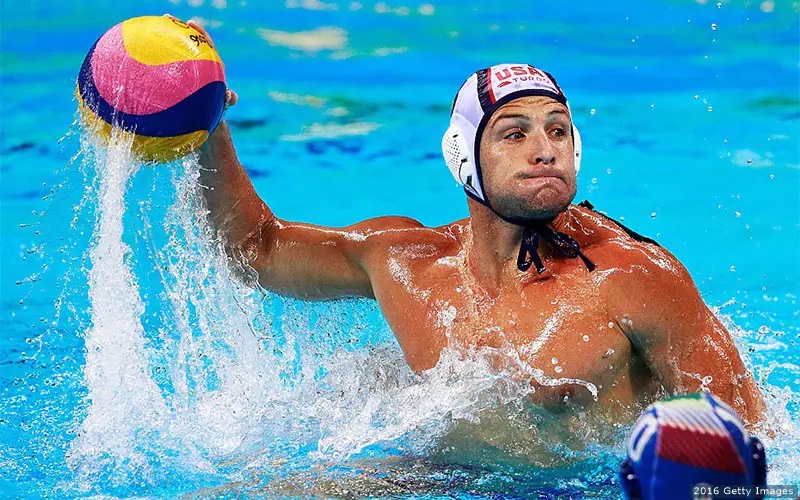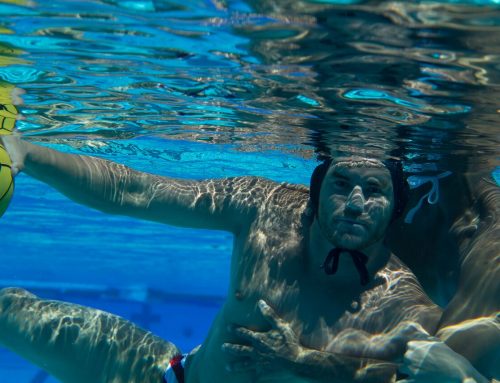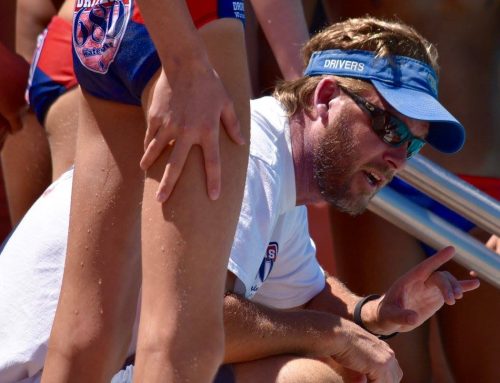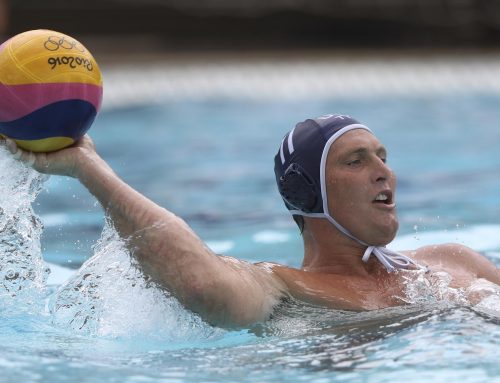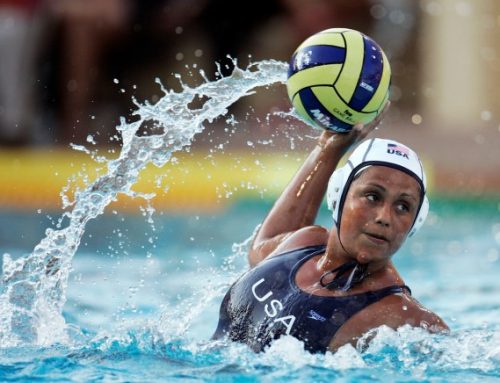S1E4 – Tony Azevedo
You likely know Tony as the face of water polo in the United States. He is a 5X Olympian, participating in Rio, London, Beijing where the US Men won a Silver Medal, Athens and Sydney. Tony graduated from Stanford where he dominated the college scene winning the Cutino Award each of the 4 years that he played college water polo as the outstanding male player. At Stanford he produced 332 career goals.
Tony has played internationally in Italy, Croatia, Montenegro with some incredible stories to tell.
Since retirement form international water polo he has founded 6-8 Sports with his wife Sara and now 3X Olympian and gold medalist Maggie Steffens. Tony recently was on the commentary team for the NBC Olympic Coverage of Tokyo 2020. Tony also hosts his own podcast with Dave Williamson that is informative and entertaining about the goings on of a lifetime dedicated to water polo.
Want to leave a message or make a comment that we can use in the show? Hit the link and go!
Podcast Transcript
I'm more comfortable talking to her. I heard it just started snowing a new thoughts. That's how we got in the last storm cycle. We got 67 inches of snow up in the mountains. So they're getting hyped to get ready for ski season. So you got to come back out, Tony and, and we'll go skiing again this year. You remember when you saved my son's life and picked up.
I do remember. I do remember it's one of my favorite ski memories. We, uh, so Tony and Sarah and Cruz and I, uh, all went up to Brighton, to ski after one of the cha uh, one of the challenges that we ran here in salt lake with Tony and we, we decked him out and all the ski gear and, uh, we're cruising down and Cruz was doing fantastic.
He was cruising like. As five-year-olds do just got like cold and stopped and like was done. It's like, okay. So I just went into ski instructor mode and just picked him up and skied him down to the lodge and got him hot chocolate instantly and saved his life. So I realized that I like, I mean, like, I don't know if you ski, but like I didn't definitely didn't grow up skiing.
And then I got to high school. Where like I could have skied, but then I'm not going to risk my career to ski. I just started like four years ago and I'm, I'm trying, I tried snowboarding once and I fell so many times that I've never been sore in my life that, uh, I'm sticking to skiing, but like, dude, I'm just trying to like start this thing, you know, do you not know my first June team national team experience?
Because you're still younger Canada, December 26th. Oh my God. When I had full dreads, I was Waterpool version of cool runnings. I didn't have, I didn't have anything prepared for cold weather. I was wearing like shorts and. With the breakaway USA water polo pants over it. Right. I didn't even have a turtleneck.
Right. So we get there. I I'm freezing. And I didn't know, I had to bring my own money for like miscellaneous stuff. I thought everything was paid for. So I was doing every fair bet even on the plane. So I saw, I think Adam right, dared me to eat an entire canopy Alto.
Right. It's no doubt getting into. What degree weather and I couldn't breathe. Like just even like waiting for the, for the vans to come cause my mouth was burning cause it was raw and I'm breathing, freezing cold air. We'd get to the hotel. And the first thing, I just, the first time I'd ever stepped on ice, all six foot eight.
And we just back on my back. So you're not a skier, not a skier male. And I ended up taking a train. I don't even know where we went because it was before iPhone. So I was like, oh, they said, yeah, gold. This way we thought it was getting like a trolley, like in San Diego, I'm familiar with, we got on a training camp.
And went left Calgary and we're like on the way to Toronto or somewhere miss practice. But we'll do over the goal is where, because I'll try to find a warm jacket. Well, th there's a standing invitation out there for any of your friends or. Uh, Janai and Tony to come to salt lake. I'll take your ski and I'll get you the warm clothing.
We'll have a great experience, uh, up on the frozen water up there. We w it's it's one of my passions we're excited to see as a family again this year. And so w we'll get you. So let's get back to Waterpool. What we're more familiar with. Sounds good to you. And your next podcast, water port Tony one. So we're here with, uh, Tony Acevedo, five time Olympian, uh, participated in Rio, London, Beijing.
Where they won the silver and better Athens and Sydney. Uh, Tony graduated from Stanford. For those of you didn't know where he dominated the men's water polo scene, uh, as the Contino award winner for years that he played there scoring 332 goals. Tony played, uh, in Italy, Croatia, Montenegro, and most conversations with Tony that I've ever been.
And in some sort of fantastic story around those. So I'm sure we'll get into that as well. Um, and since retirement from the international water polo scene has founded 68 sports with Sara Acevedo and now three time Olympian Maggie Stephens, uh, totally recently was on the commentary team for the NBC Olympic coverage of Tokyo 20.
Uh, Antonio, Antonio has his own podcast. The Tony Acevedo podcast that is hosted by Dave Williamson, a great conversation. I've been a guest on that podcast and it's, it was super fun. Uh, and Tony has an incredible lifetime dedicated to water polo. So Tony, thanks for joining us Janai today from Southern California, where it looks like you just got out of the water from the academy as my guest.
You know me well, Sean finished with, you know, 45 minutes to shooting. That's my favorite part to get in. Yeah. And now back to the business world. Fantastic. Let's talk about six, eight sports. Uh, it's your it's growing. I mean, you've been growing it quite a bit over the last four or five years. Uh, this podcast we're trying to focus on sport growth and six.
Trying to take a look at water polo and a little bit different direction. We've worked together on the series six, eight series. We've worked together on challenge on game desk. Kind of just give us an overview of how you're trying to bring water polo into the modern era with technology and data. Yeah, I mean, look, the main thing to me is right now and in a lot of other sports too, no one is focusing on that individual athlete, right?
That one parent who has that one. Who's so passionate and wants to be great, but there's no, there's no means to tell them where they stand and what they need to do to be great. Right. And that's kind of the most frustrating part about sports like water pole that a smaller. You. And I see it all the time, going around the country, kids with talent kids that are fast, good.
They have heart parents who are willing to do whatever it takes for them to get there, but yet there's no, there's nothing that tells the kid exactly where they are here. Here's the drills that you need to do to be great. Right. And so that's kind of been the focus, another focus right now. Is really focusing on how we can Moneyball waterfall.
Right. And we've been talking with John Abu and you'll say water pole, a little bit of partnering maybe. And the main idea behind it is like, can we take statistics and measureables subject? And, and, and start to collect data over time. So we have a better understanding as to where our teams are now, where they're going, where they're trending and why they're successful for me, you take the women's team and the men's team are an example.
Right. Right. Like what, what, why did we succeed in 2008? Why, why did, was, did Terry do something. Different than Raco rootage then John Bargus and Martina scout scout. I mean, on the men's side, I went through eight different coaches, right? Nine different co coaches. What was successful, what was not on the women's side, they have three gold medals, right after guy baker.
Like, what are they doing? What are they testing differently? What are the strengths of the weaknesses? Because we know very well. We have, we all know Cammie Craig who be in the hall of fame coming up and she's a stud, but her era. It was that women's team was much different than the women's scene that I saw this last Olympics.
So what was the change? How did he measure that? And if we could use that data to better understand where we need to go. I mean, especially for us on the men's side, it could be a game changer, but right now, everything, and this goes to every single club and Federation in the world, everything is dependent on the.
Right. And his words, well, how do we know what he thinks or believes is correct? And we don't, and then we get rid of them and then got all that information that he gave us for four years or two years, or one year at a club is gone and then comes another guy. And we're like, I hope, I hope you can say. So Tony, you made a reference to Moneyball.
I don't know if you know that I actually coached Billy Bean's daughter so I can connect you guys if you want. No way. I'd love that. We're, we're, we're very close to like, fully launching that. So I think that I'd love to have his. Yeah. Yeah. It was going to play polo at Sage hill. How about that? That's crazy.
One of my favorite movies and stories of all time. I mean, I love that, that concept and that idea. I mean, you, at this point must have hundreds of thousands of lines of data just from this challenge alone, being collected all over the world. How, what are some of the trends that you're seeing in the game?
Like what are, how would you interpret that data early on here? Uh, as, as you're collecting that. So, yeah, so we, we just, we just hit 13,000, uh, people gone through the challenge, which is super exciting. And the exciting thing about that is like, you're able to see trends. People have done it multiple times.
People, you know, successful people. And now with the six, eight series, we got to see so many top level athletes, a trend that I think we, that a hundred percent we found. And again, that always. Varies a little bit. You're going to get a guy with an amazing radar gun or get a guy who can jump out of his suit, but mostly people successful at the 12.5, the med ball and the Bowie are the most successful in all.
When it comes to those three drills can, you're pretty much on par the best player in the waters, those three. And then we're starting to measure. Because we're using the game desk. So it's like, how many steals does someone get? Well, the guy who gets the most steals always seems to be the top and the buoy and the vertical jump.
Right? Yeah. So you can start to see some correlations that go along with that. Interesting. Well, yeah, because if you're, if you're getting steals at a game and we had a talk with the Orlando magic, uh, analyst yesterday, actually with Maggie and one of the, if you're getting a steal in a game, you have long arms or you're super tall, right.
That's one reason. Um, You are quick, you can get quickly jump in front of the ball, you know, jump before or beat someone to a ball. And then the second thing is your waterfall IQ. You have a high IQ, you can anticipate, you can read. And obviously we can't read an IQ through the challenge, but we can read it through the game desk.
Right. So now we're kind of covering that, that base. Well, and you've even talked about, you know, with Maggie about that X factor, how do, how do we measure that X factor with an athlete in terms of being able to see those on the, the undescribable traits of an athlete that just make them great, right. In terms of trying to remember that yeah, exactly.
A hundred percent. And Brenda is a great example. The hard part when you do the challenge is like, you're you, you sit there and I get it all the time. Mostly it's like the older generation it's saying, oh, well, you know, that, that doesn't measure the, uh, the best athletes. You're right. It's not meant to measure the best athletes.
It's meant to get data, to show a over time if they're improving and B, if they are the best athletes, what traits do they. And then the second part of it, and this is where a Brenda would be perfect in this, because she would be actually amazing in med ball. She'd be amazing in two buoy, she'd be pretty good at the 12.5 and then maybe like me, I'm the radar gun.
You're low, vertical jump. Probably not, you know, obstacle be okay. But guess what? The game desk she'd be. So. That it totally make up for her falling in not the top 10 or 15, because she'd have a plus or minus of 10, because she has four assists, a game, four goals, three steals, 10 earners, you know, six aren't injections and that's Brenda to hundred.
Awesome. So, I mean, you had mentioned a little bit about this, but how, how do clubs and athletes that are outside of California get noticed? I mean, using this system, what's the best way for those kids who want to be great that are maybe not in, um, uh, the, you know, in Southern California and Northern California, proper, how, how do they progress in the game, in your opinion, what it, they have to understand the importance of.
And they have to really coaches have to open their eyes as to where they stand in the world of waterfall, where and what the better players have. So what I see a lot is I see the 13, 14, 15 year old kids and they're dominant in their hometowns, but they really don't understand how to move over there.
The legs and breaststroke kick or the importance of the med ball, right. Of having strong life. It's not just the med ball, but having strong legs in general of passing. And these three things, you get these players from all over and they're so talented and they worked so hard, but they're lacking on just the basics of how to hold a ball of how to pass correctly of calming down.
So I think that's really where the challenge was built. It's like, where do you stand? This is where you are. You're pretty good. You're not good. And this is things you can do to get better. The other thing is like you do, when you get to a point and then you're in high school, you have to expose yourself to different waterfall.
Like financially you can do. I was lucky enough we didn't have money growing up, but I went with my dad on trips as like. Kind of like the, whatever it was, basically, he all, he paid for me and I'd sleep with him in the hotels. So I got to see the exposure from playing against a hungry or playing against a Serbia at a young age.
It was Yugoslavia then. But if you can't make it to a Europe, make it, make it to California or get outside of your state and see the different types of waterfall. Go do a camp somewhere else. Right? Janai runs camps myself. Like there's plenty of opportunity. To, to expose yourself to different water pole, because that's going to help you a understand truly where you stand and be, become more, have a higher waterfall IQ because you're listening and hearing so many different thought processes.
Right? Well, and I think w I mean, one that's obvious is that we're coming into the second season of the six to eight series across the country. I mean, we've got, uh, I believe Connecticut, Texas, Utah. California named his locations that are going to go. I mean, those are fantastic ways. How would an athlete get involved in one of those to be able to be recognized and see some of that high-level play?
So Sean it's, you know, it's, I think what's been exciting about us doing it together is we're trying, we've always been trying to solve the issue of how do you get quality games to athletes outside of, uh, you know, Southern California, Northern California, wherever. And this is kind of, we've seen kind of how this is evolved.
Right? We had Jack Merrill sign with Stanford who wasn't really on that radar before the 600 series. We had great Carson go to UCLA. We've had so many players signed with top schools because they were good. And then all of a sudden, when they understood where they stood, you know, their level, they got to play against that high level competition.
They stood out and maybe before they, they didn't. Right. Right. So, yeah, I mean, for us, it's emailing us. Getting on the list and we just try and make it as, as we're pushing the ones that are trying to get to college first. Right. Obviously getting them exposed, but, but we also always allow in young players because.
That's also building the whole evolution. If we can have freshmen, sophomore with some of these great players, you're going to already see, you've talked about the great bend four who had that awesome tournament, you know, and I mean, he was great in the series. He's a little freshmen. Well now. And now other kids are gonna look up to him and whatnot, right?
Yeah. Well, and it's so fun to watch those kids, even like we went to, I went to every one of those series last year and we obviously live stream them, but those kids got so much better from one camp to the next. I mean, it's fantastic. I've seen even my own kids from Olympus who have participated, they've gone on to see some great things happening as well.
So it's, it's exciting to see, explain to me this and deny your perfect answer this. Like I had a coach tell me that. The six, eight, the problem with the six, eight series, right. And again, we've had the, all the top schools, the top eight, all of them responded that they love our videos and they're watching, but I had a, I had a coach say, you know, I'd like to see these players play in a system.
And I said, why. That you can start all in high school. You can go watch them in a system, a system's easy to play. Hey, you swim here. You do that. I want to see them. And this is the best thing that we saw on the series is the first two games were terrible. Always. Yeah. Even with, even with like national teams, like different age groups, right?
Whether it's youth or cadet, when there's new people playing together, getting through, being accustomed to play with new players in different positions, it takes times to work out the. A hundred percent and that, and that's the whole point is like by the third, fourth, the last game almost always went. And there was a game that went in on the last day to overtime it's because they learned to communicate with each other.
Hey, our team doesn't have a strong center. I'm going to post up. They learn how to play, and then you talk, you want to shine at college. When you show up, you want to shine on the national team when you show up, well, guess what. You got to learn how to play in any kind of system. You gotta learn how to adapt, how to talk to your teammates, be a leader, right.
Take over roles. And that's, that's where I see a big value in this. So just quick question, tell me what level was this coach coming from? Was it a collegiate coach? Was it a high school coach division one collegiate coach. So that again, that's, that's their preference, right? They might have their own recruiting preferences.
Um, and it's not for everybody. If you can, you're never going to have a one size fits all, especially in a sport like ours. But my thing is the number one thing I think that hasn't made this work in the past is there's just not enough data, right? It's not baseball, it's not basketball. Um, Bailey's or first person who came up with this idea pitched it to me over 10 years ago.
He's like, nah, you're with Nike, make a Nike Waterpool combine. It's like. Yeah know, I would have to be replicated the same way throughout the entire country to make it standardized. And it was way too overwhelming for me. Then it comes along Tony and you took on that challenge. Right? And so with that challenge, I think over time, you said 13,000 athletes have gone through the system.
So the more athletes go through it, the more. That you're going to have, and the easier it is going to be break down. I mean, James Graham has done a UOP, you know, with this one particular college team, but being able to standardize it for the nation is a task. I would never want to take home myself. So thank you for doing it.
And it's starting to work out. I think it's only going to get better. Yeah. Um, how do you, how do clubs get involved? If a club wants to run the six to eight challenge, what's the best way for them to get connected with six, eight. Yeah, it looks it's just reach out. So we have like PV 680, you know, we have our international, so this is, we're trying to standardize this around the world.
And I, Australia is probably the biggest one right now that we're working with, um, just reach out to us and, and the way it work, we, we have a lot of ways that works. One of the ways that. That's right. My wife know the email there and whatever it says, it's my wife, even if it's, but yeah, just reach out. And essentially all we're doing is giving you data, right.
And hopefully at the end of the year, you can start to see trends. For coaches for players, Hey, this entire team is improving in every category or, Hey, this one player is not improving. That's a player problem, right? If the whole team's not improving, then we can think about new drills for the coaches. And we're really just there to support people.
Think it's like, oh, you know, at some financial, no, it's not. I usually just come to a camp, teach you how to be certified, and then it's on you. And then all Maggie and I do is give you feedback as to like what these. Red or yellow or whatever the results mean, you know? Yeah. I mean, we we've run it at Olympus for a couple of years and my kids are, we're wrapping up our fall high school season.
My kids are already asking, when are we gonna run the six, eight challenge again? They love it. It's just a part of the fiber of what we do. They, they want to see where the results are and how they've progressed. So we're excited about that. So, you know, who it'd be amazing at, it would be Janai. And tonight one of those he'd be one of those I know for a fact that he would do his goalie drills.
Cause their specific goal. And then he'd go into the field and do all our drills and then probably beat all of us to win all of them. Well, Tony and oh, you remember this Tony? I, when I had like a double barn off of a demonstration, like you can't show me up on this, you have to let me do the sheet. Yes, you would throw out some ridiculous shots.
Somehow it'd be like a pinch bar and I'm like, Jesus tonight. Like holy guy, man. I'm assuming, it's assuming that gets me, is having someone hang on you for 25 meters and then I have to swim back on deep, instant transition. And then when it's your turn to shoot how the same thing, but yeah, for the, these types of drills, this would've been my bread and butter, the vertical.
Oh, I remember even when Rocco's coach, he was telling me some stories about 10 pests, they doing some ridiculous things. So I would stay after practice and make sure I bet be 10 pistes touches by two were the jugs, the jugs, Brian Alexander, who we're going to actually have on the show cut out. So I guess he did 60 jugs was super proud of that hour.
So that night. That died. I did 61 and the same thing with bills, I got down to two drugs. So I was doing one at each head as strong as bills is, is risk smart, strong enough to support it. But because all the fingertip pushups, I had strong risks, she bails that he'll, he'll deny that till he dies. But yeah, so we're referring to bales, Ryan Bailey four time Olympian, also silver medalist.
He's one of our good friends and it is true. That he was the first to come up with the idea of the challenge. Like he was we'd joke around about it, but he was a hundred percent, the first kept telling all of us. And then as I traveled around the world, it was one of those like, wow, I think this could actually.
Yeah. So that's actually a perfect lead into one. I guess the question that we're going to close on here just for interest of time. I mean, you look back at that silver metal effort in 2008, you have guys like Adam Wright, Merrill, Moses, Ryan Bailey yourself. What made that group special? Like what made that, I mean, obviously you're great water polo players.
You go on, but you have remained tight and enjoy each other's company ever since. So, I mean, what, what has made that group so special for water polo? Well, I'm going to, I'm going to say three things that, that massively contributed to our success. And the first was, was the time when 2000 to 2004, the Raco rootage.
My dad was the assistant. Then that time brought us together more than anything. I mean, Janai was a part of that quad via the things that we had to go through. The trainings that we had to endure. Gave us so much. Self-confidence right. Like we could do anything. I mean, he even said Rocko greatest coach in the world that's that he experimented with us.
I, he couldn't believe that we could continue swimming for this amount of time. And when you have that commitment Raco you can say tons. Everyone has opinions on Raco, but one thing he did so well was bringing together the team and with us. It was about a, the personnel guys who really helped the team.
Jenna is a great team player, Adam Wright, myself. I mean, guys that just really are there that bring an uplift the team because that's so crucial. Right. And of course the fact that we're going we're training so much, we all kind of hated him. So we banded together as a crew. And I think that that in itself was huge.
Then you go on to. Terrible two and a half years where we had guy baker as a coach, then they fired him. We had my dad as a coach, then they fired him and it kind of left us as in this moment. Like we, I don't know if people know this, but qualifying for the Pan-American games in 2000 for the 2008 Olympics, like the coach, because Terry Schroeder was, who was the assistant, had a job.
The coach was Adam and I and bales. And it was like, And so we took ownership in this team. It was like, whatever happens, we like, it's on us now, guys. Like we can't not train all out. We can't not, um, you know, believe in ourselves and be humble. Like w we lose it's all now it's on us. And then I think that last, that last tipping board was the fact that so many of us were overseeing.
Right. And came back. We got that experience that, that confidence, now we can play against Europeans. We had that from Raco and then Terry, really Terry and Robert Lynn did a phenomenal job of Robert got us in the greatest shape of our lives. And he knew he could do whatever he wanted with us because we took ownership.
And Terry did a great job for me as a captain for all the athletes, just to understand a humility and playing together. And sometimes less is more. And we won that. And I, and Tony, going back to that qualification game though, in Brazil, against Brazil, do you remember what happened that morning? Yeah. Well, we thought we got kidnapped wherein in Brazil.
No. Okay. Explain, hold on. Where you not on the bus with us? Oh my God. Yes. I was on the bus. Yeah, well, you've played so many games, so many pennies, so many limits that you have us forgot about being kidnapped in Brazil and take it to the favelas. All these be rescued by the SWAT team, finding out that we actually weren't kidnapped that the guy was just lost.
You don't remember that? I totally remember that. It's crazy. Cause you guys asked me and I hadn't really lived in Brazil. I only knew really. I ended up living for years in Brazil. That was my, the last contract I had. But you guys were like, Tony, this doesn't seem right. I'm like, this definitely doesn't seem right.
I texted somebody in Portuguese and then they wrote back and they're like, dude, what is happening? And then all of us are freaking. You w you w you were like going to go get the bus. So basically we got morning training, right? And we're going to go back to the village, eat something, take a rest, and go back to the gold medal game to qualify for Olympics.
And instead of going back to the village, the bus driver, his job was literally in the opposite direction. And I was like, I can't see the statue anymore in two hours. Well, it must've been traffic must been detour. Then all sudden these black SUV's flank the bus and run us off the road and start screaming, yelling.
Jessie tries to get off the front of the bus and they point guns at him. They grabbed the bus driver, filled him in the dirt. I tried to get out of back window and I've got some of the biggest artillery guns facing point of my face was like, oh, they're going to blow us up. This is, we're just done. They get the bus ever back on the bus with a gun to his head and started screaming in Portuguese.
I don't know if you understood what they were saying, but I didn't speak Portuguese and they take us off the freeway into the favelas. And there's no place to turn around because it's too narrow. So it gets deeper and deeper. It's like, oh, there's hijacking all of us. It turns out that that was the rescue squad that came to rescue or the American team that got, they thought was hijacked by the bus driver who had actually just gone through.
Like two and a half hours later. Now we get back on the freeway. There's a helicopter giving us the escort. I get back to the village and it turns out that it was all mixed up. Supposedly, even though we were playing Brazil in Brazil and we didn't get a tiny wheel or taking that, but we still came back and won the game.
Yeah. And that, that, that happens more than you think. Dude, member. In Rome. I was woken up at two in the morning. The day before we played Italy taken to the police station. I forgot that my memory is just as bad as yours. It's I'm telling you taking the police station. I sat there, they claimed there was something wrong with my, my, my visa that I was criminal bullshit.
Next thing I know. About three hours before a game I'm released to go back home. I hadn't eaten. I've been up since two in the morning. You don't Terry and Barbara was up Barbara Calvis. The gray was over there trying to help out. Next thing I know everything was dropped. I show up, I eat, I go to the, I go to the game.
And don't worry about it. I scored six goals and we be in Rome in Italy. Well, we, we ha we have, uh, when games start going the wrong way, we have a saying like, w you know, when the USA plays hungry and hungry, you have to beat everyone, not just the teams, right. Or, uh, or Italy in Italy, in Rome, I guess you have the same thing happen.
And so that's exactly. We'll do it. Thank you guys for having me, man. Thank you, Tony. Appreciate it. And like I said, Tony and crew has some stories to tell. So one of my goals here, Tony is to get you and your, uh, and get Adam and Merrill all and Ryan Bailey and your teammate all on the same podcast and talk about teammates, the power of teammates.
I think that would be incredible for the people to see those interactions. But I know you've got to go. Thanks for joining us. One last thing I know you have the newspaper and coffee is your pregame routine, but do you have your favorite hype song of all time that used to listen? Oh, so I was opposite.
See, everyone would sit there and listen to hype Merrill would I think he's, you would have, he should be happy that the music was so loud that the whole basket here, but I would, uh, I would actually just listen to either like something soft, um, or no music. I just focused on reading and that was it. I was so crazy when it came into the water, I just needed to calm down and music stopped me two pumps
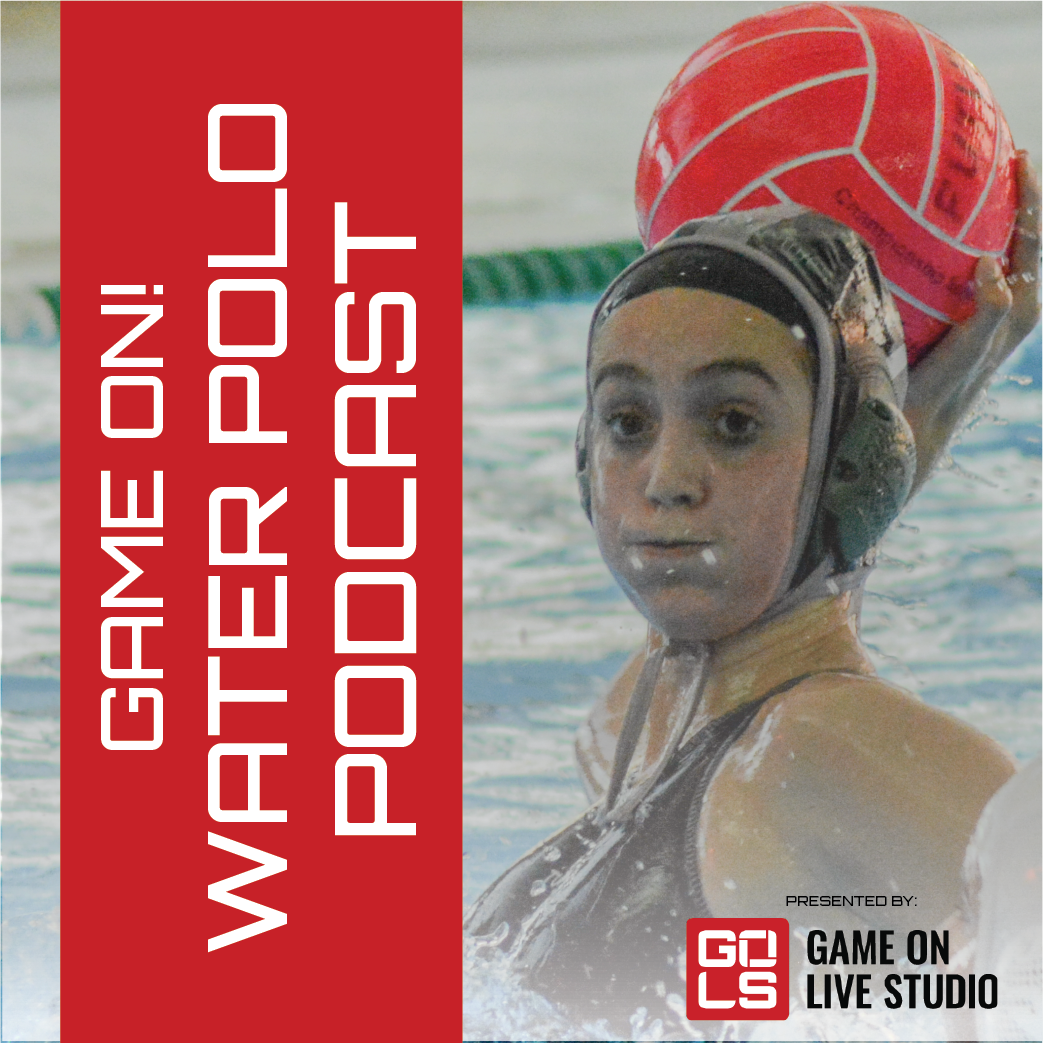
Contributor Details
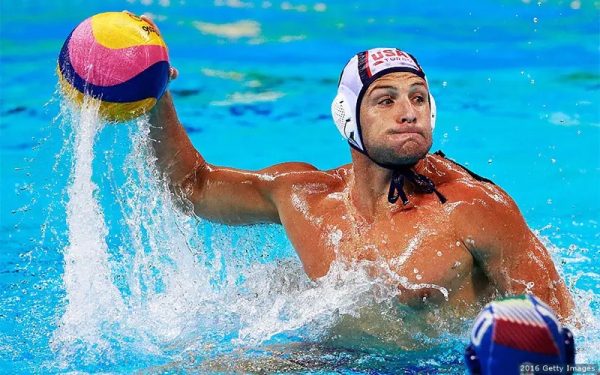
Tony Azevedo
You likely know Tony as the face of water polo in the United States. He is a 5X Olympian, participating in Rio, London, Beijing where the US Men won a Silver Medal, Athens and Sydney. Tony graduated from Stanford where he dominated the college scene winning the Cutino Award each of the 4 years that he played college water polo as the outstanding male player. At Stanford he produced 332 career goals.

